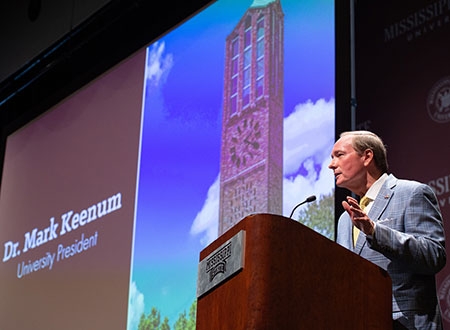
President Mark E. Keenum gives a warm welcome to new students and their parents during a June orientation session in Bettersworth Auditorium. These upbeat campus events introduce incoming freshmen and transfers to life at Mississippi State University and help them get acclimated to their soon-to-be home away from home. PHOTO: Megan Bean | Public Affairs
$2 million grant expands MSU’s evaluation, monitoring of marine mammals and sea turtles
Mississippi State is tackling the issues of environmental restoration and climate resilience through impactful research programs, and now the university’s efforts to advance projects along Mississippi’s Gulf Coast will move forward with help from a bill recently signed by Gov. Tate Reeves. The Evaluation and Monitoring of Marine Mammal and Sea Turtles Abundance, Population Health, Habitat Delineation, and Restoration program, or EM MMST -- a project that falls under the university’s Global Center for Aquatic Health and Food Security, or GCAHFS -- is gaining approximately $2 million to support its work studying the population dynamics of marine mammals and sea turtles, their health, and the delineation of their habitat.
UN Environment Programme picks Correa for global advisory group
A renowned freshwater ecologist and Mississippi State scientist is lending her expertise to a historic international report, respected as the world’s most comprehensive account of environmental crises of climate change, biodiversity loss and pollution. Sandra Correa, assistant professor and researcher in MSU’s Department of Wildlife, Fisheries and Aquaculture, has been invited by the U.N. Environment Programme for membership in its Multidisciplinary Expert Scientific Advisory Group (MESAG). The 30-member advisory group will help direct the seventh edition of the “Global Environment Outlook: Action for a Healthy Planet (GEO‐7),” a report of the planet's state and the global environment's direction, and a call for transformational action needed to address tri-planetary crises. The publication will be delivered during the U.N. Environment Assembly (UNEA-7) in 2026.
Physics and Astronomy's El Fassi first to observe formation of rare ‘strange matter’
A Mississippi State physicist and her colleagues are the first scientists to observe how subatomic particles -- known as lambda particles -- are formed, helping researchers learn more about their production and formation in atomic nuclei, deepening the overall understanding of the dynamics of subatomic structure that governs most of the visible matter in the universe. Lamiaa El Fassi, an associate professor in MSU’s Department of Physics and Astronomy, published the results in a recent edition of Physical Review Letters. Lambda particles -- comprised of up and down quarks -- are common building blocks that make up most of the visible matter in the universe, and a rarer particle called a strange quark, known as “strange matter.”
Story State at MSU wins national accolades
Mississippi State University’s Story State, a competitive Department of Communication event that hosts storytellers from across the state, has been recognized by the National Broadcasting Society-Alpha Epsilon Rho, a national electronic media association. “Story State 2022: Fostering Innovative Storytelling” won first place in the academic/professional production category at the organization’s spring event in Las Vegas. “We have an abundance of talented storytellers working in Mississippi who have a lot to share,” said Josh Foreman, Story State coordinator and communication department instructor. The Mississippi Humanities Council provided monetary support for the production of Story State 2022.
DAFVM Spotlight Employee: Jake Bullard
Before seeds are planted, there’s work that goes on behind the scenes to help farmers produce the best yield. “My favorite part about my job is harvest season because this is really where you get to see a whole year’s worth of work come to fruition,” said Jake Bullard, assistant director of the Official Variety Trials OVT and Foundation Seed Stocks programs with the Mississippi Agriculture and Forestry Experiment Station. The Official Variety Trials conducts replicated small plot research throughout the state for six commercially grown agronomic row crops, providing Mississippi producers with unbiased third-party yield data aiding in varietal selections for their operations. The crops include soybeans, corn, peanuts, wheat, oats and grain sorghum.
DAFVM Spotlight Employee: Alexandra Danel
As a veterinary neurology and neurosurgery resident at the College of Veterinary Medicine at Mississippi State University, Alexandra Danel performs surgeries, manages complex medical cases, and engages in research to advance the understanding of neurology and neurosurgery. “The complexity of the brain and nervous system is fascinating and specializing in this field allows me to delve deeper into understanding and treating neurological conditions,” said Danel. “The intellectual challenges, constant advancements, and the ability to make a significant impact on an animal's life also contributed to why I chose this career path,” continued Danel.
Smoke-free policy enhances healthy environment
Mississippi State University is a smoke-free campus. Official policy prohibits the use of any combustible or vapor products anywhere on campus property including university buildings, university grounds, university vehicles, parking areas and sidewalks. The smoke-free campus policy is part of the university's commitment to creating a healthy environment for all members of the campus community. Use of cigarettes, e-cigarettes, cigars, pipes, hookah or other similar devices are prohibited by this policy. The complete policy is available at www.policies.msstate.edu/policy/91301.
The Office of Public Affairs provides Maroon MEMO as a general information
resource for Mississippi State University employees.
Web links are subject to change. Submit news, questions or comments to
Jim Laird.















